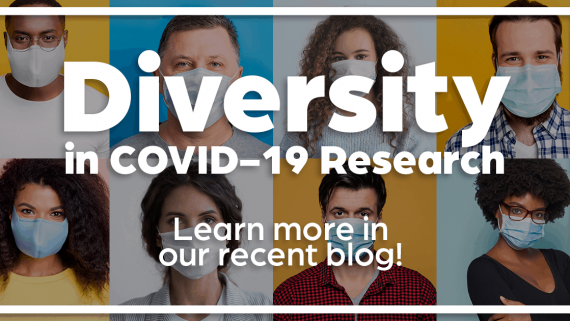As we pass the first anniversary of the first reported case of COVID-19 in the U.S., a lot of uncertainty remains despite the tremendous progress. Diversity has been a challenge long before the coronavirus, and it’s vital to end the disproportionate impact in communities of color. As clinical research efforts continue to deliver new ways to detect, prevent, and treat COVID-19, study participants’ diversity will be more critical than ever.

Importance of Diversity in Research
Genetics and biological makeup differ for every person. For vaccines, this means how antibodies are produced in one ethnic group can vary from others. Since the pandemic began, data gathered shows much higher rates of infection, hospitalization, and death in people of color.
Diversity also covers various age groups, gender, and backgrounds. Older individuals and those with underlying health conditions are more likely to suffer severe symptoms, hospitalizations, and death as well. The populations with the most significant risk stand to benefit the most from the new possibilities being developed for COVID-19. At the same time, they need to be tested in these groups to ensure they are safe and effective for everyone.
Disparity Causes
Historical mistreatment of minority populations in research studies fuels mistrust and prevents some from participating. Though safeguards, ethical laws, and oversight by the FDA have made research studies much safer, the past is still fresh in minds. Others feel they lack the tools to make it to appointments due to lack of transportation, inability to leave work early, childcare needs, and so on. The reality is that many studies offer options to help with those challenges, such as reimbursement for time and travel, transportation help, and extended hours.
By talking with the study office, you can learn more about the study, potential risks, and possible benefits. The commitment for each study varies. A vaccine study may last two years, while an antibody study may be one visit for example. While there are criteria for each that must be met, flexibility of choice is always a bonus. Volunteering in clinical research studies is 100% voluntary throughout the entire process. You can end your commitment at any time in the event you cannot continue.

ActivMed Practices & Research is proud to be a part of history in the fight to end COVID-19. Our site participated in the large AstraZeneca vaccine study, as well as other antibody test studies. Get further details about enrolling COVID-19 studies here.
Without the selfless gift our volunteers offer, the progress made thus far wouldn’t be possible. To learn more about volunteering or view a current list of enrolling studies at each of our sites, visit our website.
References:
https://hub.jhu.edu/2020/11/30/diversity-covid-19-vaccine-trials/
https://www.henryford.com/blog/2020/11/diversity-in-vaccine-trials
If you have survived a stroke or heart attack, your chances of having another one are 1 in 4. The good news is, up to 80% can be prevented through managing chronic conditions, and lifestyle modifications. May is American Stroke Month, and the 2020 initiative is “One is Enough” which focuses on preventing another stroke. Not all risk factors are within your control, but for the ones we can control, it is time to make changes, even in the midst of COVID-19.
Chronic Conditions and Stroke Risk

A stroke happens when a clot or rupture blocks blood vessels that carry oxygen and nutrients to the brain. This disruption in the flow of these vital nutrients results in the death of brain cells. Depending on the severity of the stroke, and where it occurs in the brain, the resulting damage can vary. Stroke sufferers can have paralysis, speech or language problems, memory loss, and changes in behavior.
Several risk factors increase your risk of stroke. Family history, age, and gender are factors that no one can change. However, managing chronic conditions such as heart disease and diabetes play a vital role in prevention and reoccurrence. Diabetes and heart disease impairs your body’s ability to effectively transport oxygen and the critical nutrients we mentioned earlier to your brain. By working with your doctor and following their plan to manage these conditions, you can reduce your risk of stroke. Eating a healthy diet, staying active at least 150 minutes a week, and living tobacco-free are some of the lifestyle recommendations the American Stroke Association suggests in addition to the management of chronic conditions.
Hidden Dangers of Stress and the Pandemic
The COVID-19 pandemic has taken the world by storm, changing life as we knew it. In addition to fears of contracting the virus, many lost their jobs and businesses, creating a financial and emotional strain few have seen before. During these unprecedented times, stress levels have understandably risen. However, continued stress over long periods can increase your risk of developing certain heart diseases such as high blood pressure if not managed. High blood pressure is the number 1 controllable risk factor for stroke.
Know the Signs
The American Stroke Association uses the acronym “FAST” to help recognize the symptoms of a stroke to get immediate medical attention. It may mean the difference between recovery and disability, so knowing the signs is vital:
- F (Face Drooping)- Does one side of the face droop, or is it numb? Ask the person to smile. Is the person’s smile uneven or lopsided?
- A (Arm Weakness)- Is one arm weak or numb? Ask the person to raise both arms. Does one arm drift downward?
- S (Speech)- Is speech slurred? Is the person unable to speak or hard to understand? Ask the person to repeat a simple sentence.
- T (Time to call 9-1-1)- If the person shows any of these symptoms, even if the symptoms go away, call 9-1-1 and get them to the hospital immediately.

ActivMed offers free health screenings for blood glucose, blood pressure, and more. To learn more, visit our website here.
During COVID-19, ActivMed Practices and Research is committed to ensuring the safety of our patients and staff. Click here for our latest COVID-19 facility updates.
References:
https://www.stroke.org/en/life-after-stroke/preventing-another-stroke


